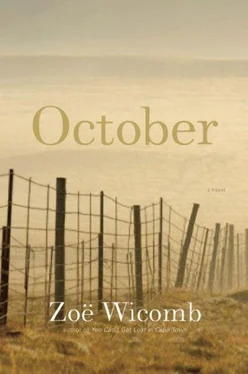Nicholas was not a vain man. He wore a goatee and a moustache that marked his respectability. For some time it had been white with age, in other words, what is known as distinguished in a man. Thus he did not long for the days of youth when he courted the beautiful Antoinette with his raven-black hair; rather, it was the sprinkling of salt and pepper of his forties, when poor Nettie had already departed, that brought a tug of nostalgia. Youth, he knew, was overrated. Being hotheaded and impetuous, a young man could not know where he stands, or indeed at times how to stand, his hands darting in and out of pockets searching for a comfortable place.
How well Nicholas remembered his youthful arms dangling awkwardly, or how shifting his weight from one hip to another brought no end to uncertainty. Then, neither Klaas nor baas, it was a matter of tottering and stumbling on shifting sands. No, it was in the middle years of salt-and-pepper respectability, when Nicholas stood firmly on the rock and uttered his words with precision, that he knew who he was. That, he thought, was also when a man was most attractive to women, for he could not fail to note their interest. Not that he’d had much to do with women. With the help of God, Nicholas had found a wife whose price was above rubies, a good woman who produced two healthy children, but who died all too early at the age of thirty-nine. Yes, he had been tested by God, but that premature death had not encouraged desire for another marriage. He was perfectly capable of boiling an egg himself, of raising his two children, and the good people of Kliprand helped out from time to time, for Meester was a good man.
Nicholas believed that there was a handsome solidity, as well as virtue, to be found in a disciplined man given to gravity and kindness, but irrevocably single. So people said that Meester was a good man and that a good man, as everyone knows, is hard to find. Which for some with a literary bent might signal a well-deserved murder, although it would be foolish to expect a match between life and art.

It is not the case that Mercia neglects her duties. She works as hard as ever on lectures, tutorials and supervisions. Given who she is, she expects no allowance for slack, but it is the case that her research project on postcolonial memory is slowly being supplanted by the memoir. Mercia reassures herself that the funded work is well ahead of target, that for once she ought to let go since the personal writing gets her through the pain; it won’t be long before she is back on track. She must make allowances for herself — it is not so surprising that her habits are being amended. For instance, if academic life has left little time or inclination for contemporary fiction, a recent review has persuaded Mercia, titillated by the title, to order the prize-winning novel Home .
The book arrived at the same time as Jake’s letter. News from home was always disturbing, making any kind of work impossible, thus she started reading the novel, partly to put off reading the letter and thinking about Jake, darling Jake, her no-longer-little brother. As it turns out, Mercia is consumed by the novel. All evening, she reads, until late that night, barely stopping to eat a hurried supper. In the morning, a glance in the mirror confirms that she looks awful, unwashed and haggard, much like the fabled writer she once would have liked to be, stumbling out of an attic, disheveled and blinking in the northern light.
Mercia may not be as good as the glorious sister in the novel, but the correspondences are there, including the ironic depiction of home. Strangely familiar, this story of siblings, brother and sister, that turns out also to be one of father and son. But theirs — Mercia and Jake’s story — is from a different continent, a different hemisphere, a different kind of people, a kind so lacking in what is known as western gentility. Theirs is a harsh land that makes its own demands on civility. Their father too, a good man, even if he does not know how to show his love for an errant son. By the time she gets to the end of the novel she has doubts about her own memoir. Is hers not redundant for the telling?
Mercia, an English teacher, an academic, necessarily thinks of texts and their families, thus she will suffer with the anxiety of influence, but more importantly, she no longer feels like carrying on with her story. There is, as she has always suspected, in the face of fiction and its possibilities, no point in telling the true tale; besides, she can’t vouch for the truth, since already there is more invention than memoir. For her story is also Jake’s, and has she not always, or in some ways, avoided Jake’s story, avoided being caught up between him and their father?
Jake’s letter, still unopened, landed in her house as a caution against writing, against the presumption of knowing (it is as if she can hear his voice) — and from such a distance too. There is also the small matter of the research for which she has been awarded a sabbatical, and which will not brook delay whilst she messes about with memoir. She does not delete the morning’s work as she promised herself; instead the file, Home, is saved and closed. Will she open it again? Mercia thinks not. An aberration, that’s what it is, another ready-made response to being left. She ought to have known from the uncanny flow of words. For heaven’s sake, she has after all no interest in this genre that floods the markets, or supermarkets, these days. All the same, she does not delete the file.
Now, whilst there is still the business of adjusting to being alone, unloved, Jake’s please-come-home letter has arrived. He has never written before, never replied to her occasional, dutiful accounts of her life in Glasgow. There are neither recriminations nor a reminder of her rash promise at their father’s funeral to return, just the brief note, a single page on which is hurriedly scrawled, without salutation: Come home Mercy. Then plaintively, You haven’t been home for ages. There is a gap, as if time has passed and he has deliberated over the next line: The child (yes, that was how he referred to his son) needs you. Please come and get the child. You are all he has left. It is signed Jacques, which she has never called him.
Mercia knows of course about the boy, Nicky, who at the time of the funeral had been packed off to his granny. She thought it strange, but it was so much easier not to ask questions. Strange too that she has not been shown any photographs; she cannot remember how old Nicky is, has no idea what he looks like, does not understand how he could possibly need her, but then people seldom say what they mean. Mercia knows Jake’s letter to be histrionic nonsense. Has he returned to drinking? If there really were a problem, an emergency, he would have called. Nevertheless, she may have to heed his request and go home, or rather, visit. Maybe that is the place where she might stop crying — at home, a place where a heart could heal.
The thought of the Cape as home brings an ambiguous shiver — the small town in Klein Namaqualand, Kliprand. Hardly more than a village. How could anyone want to live there? Why would anyone stay there? These are questions that Mercia too must ask, although in those parts the words live and stay are interchangeable. South Africans, having inherited the language from the Scots, speak of staying in a place when they mean living there. Which is to say that natives are not expected to move away from what is called home. Except, of course, in the case of the old apartheid policy for Africans, the natives who were given citizenship of new Homelands where they were to live. But they were required after all to work and therefore to stay in the white cities from which they had been ejected. Come stay with me and be my slave . .
Читать дальше













